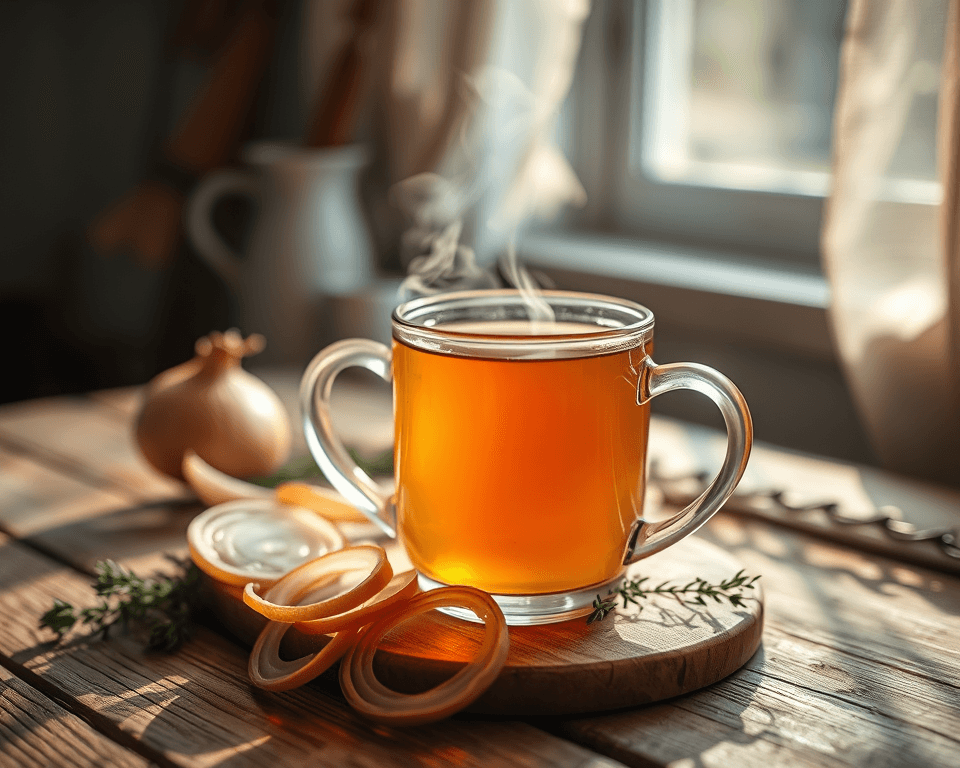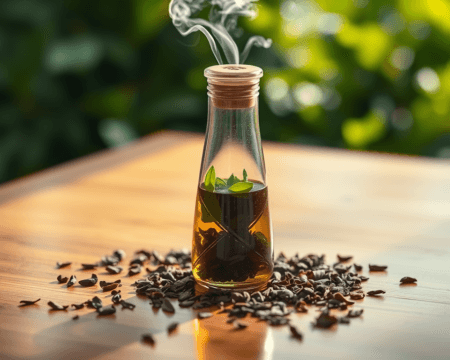Onion tea? Yeah, you heard that right. This seemingly simple infusion isn’t just some wacky health trend. It’s been around for ages and packs a punch in flavor and health benefits that’ll surprise you. We’re not just talking about a drink that your grandma swore by; we’re diving headfirst into why you should add this unique brew to your daily routine. Trust me, once you get a taste, you’ll be hooked.
Key Takeaways:
- Onion tea is rich in health benefits, including immune support and digestive aid.
- Making your own onion tea is incredibly easy and requires minimal ingredients.
- Flavor variations can transform onion tea into an exciting beverage experience.
- Understand potential side effects and how to avoid common mistakes in preparation.
Introduction to Onion Tea
What is Onion Tea?
Onion tea is essentially an onion infusion—a warm herbal remedy where the humble onion takes center stage. While many people associate onions with salads or soups, this aromatic beverage opens up a new culinary avenue. What’s great is that you can enjoy the health advantages while sipping on something delicious. Whether you’re tackling seasonal colds or just seeking a cozy drink, onion tea is a versatile component of herbal remedies. The infusion process is straightforward; steeping sliced onions in hot water extracts their natural goodness, making for a soothing, aromatic beverage.
Historical Context and Uses
The history of onion tea is rich, steeped in ancient traditions and cultural practices. Various ethnic cooking styles have utilized onions not just for flavor but for their purported health benefits. From folk medicine in Asia to home remedies in Europe, onions have long been celebrated for their healing properties. Ancient traditions reveal that people have relied on onion brews for wellness, often turning to herbal folklore when conventional medicine felt too distant. It’s fascinating how something as common as an onion has managed to hold significant cultural significance across the world.
How to Make Onion Tea
Ingredients Needed
First things first, let’s get our hands on some tea essentials. You only need a few natural ingredients for your onion tea. Here’s the lowdown:
Ingredients:
– Onions (any variety works, but yellow or white onions are great choices)
– Honey (for sweetness)
– Fresh ginger (optional for a kick)
– Water
The beauty of onion tea is that it’s customizable. You can include herbal additives like thyme or even spice blends like cumin for an extra flavor punch.
Step-by-Step Preparation Method
Making onion tea is as simple as one, two, three. Follow these detailed steps for a delightful brew:
- Slice the onions: Start by chopping one medium-sized onion. The smaller the pieces, the better the infusion.
- Bring water to a boil: In a kettle, heat 2-3 cups of water. You want it rolling.
- Combine and steep: Once the water is boiling, add your onion slices. If you’re feeling adventurous, toss in some sliced ginger too. Cover it and let it steep for about 10-15 minutes.
- Strain and serve: After steeping, strain the mixture into a cup. Sweeten it up with honey as desired, and voila! You’ve got yourself a steaming cup of onion tea.
Tips for Enhancing Flavor
Now that you’ve got the basics down, let’s spice things up a bit. Here’s how to crank up the flavor dial on your onion brew:
- Add Herbs: Toss in a sprig of fresh mint or a sprinkle of dried thyme for a refreshing twist.
- Try Spices: A pinch of cayenne pepper or turmeric can add warmth and a bit of health magic to your drink.
- Fruit Fusion: Think outside the box by adding a few slices of lemon or a splash of apple juice for an invigorating twist.
Don’t be afraid to experiment! The sky’s the limit when it comes to flavor combinations that can turn a simple onion infusion into a delightful experience.
Health Benefits of Onion Tea
Nutritional Benefits
Let’s talk about what makes onion tea a powerhouse. Onions are packed with vitamins and minerals, including vitamin C, B vitamins, and various antioxidants. These nutrients work hard to support your immune system, improve digestive health, and even have anti-inflammatory properties. Imagine sipping something that not only warms your body but strengthens it, too. Talk about a win-win!
Uses in Home Remedies
Onion tea isn’t just a tasty treat; it’s been celebrated in holistic health circles for its natural healing benefits. Feeling under the weather? Onion tea can be your go-to remedy for colds, helping alleviate coughs and chest congestion. Got an upset stomach? Many people swear by this brew as a gentle digestive aid. It’s like a warm hug for your insides.
Potential Risks or Side Effects
While onion tea is largely beneficial, it’s important to be aware of potential health warnings. Some folks might experience allergic reactions, especially if they have sensitivities to sulfites. Others may find that overconsumption leads to digestive discomfort. Moderation is key here, so if you’re new to this drink, start with small quantities and adjust as you go.
Variations of Onion Tea Recipes
Herbal Blends
Now, let’s connect the dots by exploring the myriad herbal blends that take onion tea to the next level. Try combining onion with turmeric for a healthful twist that boasts anti-inflammatory benefits or go for a flavorful ginger-onion tea that’ll drive away the chill from a winter day. Take it a step further with a calming chamomile-onion blend that’s perfect for unwinding at the end of the day.
Flavored Options
For those who believe variety is the spice of life, here are some flavored options that will keep your taste buds thrilled. Think about crafting a fruity onion tea with slices of apple or pear, creating a unique concoction that balances savory and sweet. Or, if you’re in the mood for something more experimental, try a seasonal onion blend using winter fruits or spices to match the flavor profile you’re craving.
Common Mistakes to Avoid When Making Onion Tea
Brewing Errors
I can’t stress this enough: don’t skimp on the basics! Over-steeping your onion tea can lead to bitterness, so stick to the recommended steeping time. Using the wrong temperature? Yikes. Too hot, and you might destroy the nutrients; too cool, and you won’t extract the flavors properly. It’s all about finding that sweet spot to brew.
Ingredient Misunderstandings
Here’s a pro tip: not all onions are created equal. In fact, using the right onion type can drastically change the flavor and health profile of your tea. Fresh onions are obviously best, but understand the difference between varieties. Yellow onions tend to be sweeter, while red onions can add a sharper taste. And when it comes to substitutions, play it safe. Fresh herbs amplify flavor much more effectively than dried ones, so know the ingredient integrity game to keep your onion tea on point.
This unique brew is more than just a drink; it’s a flavorful experience intertwined with historical significance and a wealth of health benefits. Get brewing, and let those onions work their magic!
Frequently Asked Questions
What are the health benefits of onion tea?
Onion tea is known for its numerous health benefits, including immune system support due to its rich antioxidant properties, aiding digestion by promoting gut health, reducing inflammation, and potentially soothing respiratory issues.
How do you prepare onion tea?
To prepare onion tea, simply slice an onion and simmer it in water for about 20-30 minutes. Strain the liquid, and you can sweeten it with honey or add lemon for flavor. Serve it hot or chilled based on your preference.
Can I use any type of onion for making onion tea?
Yes, you can use various types of onions, such as yellow, red, or white onions. Each type may impart a slightly different flavor, but all offer comparable health benefits.
Are there any side effects of drinking onion tea?
While onion tea is generally safe, it may cause gastrointestinal discomfort in some individuals, especially in large amounts. Those with a sensitivity to onions or related foods should consult a healthcare provider before consumption.
How often should I drink onion tea for health benefits?
You can enjoy onion tea daily or a few times a week depending on your preference. However, moderation is key, and it’s always good to listen to your body and adjust based on how you feel.
Can I store leftover onion tea?
Yes, you can store leftover onion tea in an airtight container in the refrigerator for up to 3 days. Reheat it before consumption, adding fresh ingredients if desired.
What flavor variations can I add to onion tea?
You can enhance onion tea’s flavor by adding ingredients such as ginger, garlic, turmeric, lemon, or herbs like thyme and mint. These additions can also contribute additional health benefits.
Is onion tea safe for pregnant women?
Generally, onion tea is safe in moderation for pregnant women, but it’s best to consult a healthcare professional for personalized advice, as some individuals may experience different reactions.
How does onion tea compare to other herbal teas?
Onion tea offers unique health benefits, especially for the immune system and digestion. Compared to other herbal teas, it has a distinct flavor and aroma but can be consumed similarly, depending on individual taste preferences.










